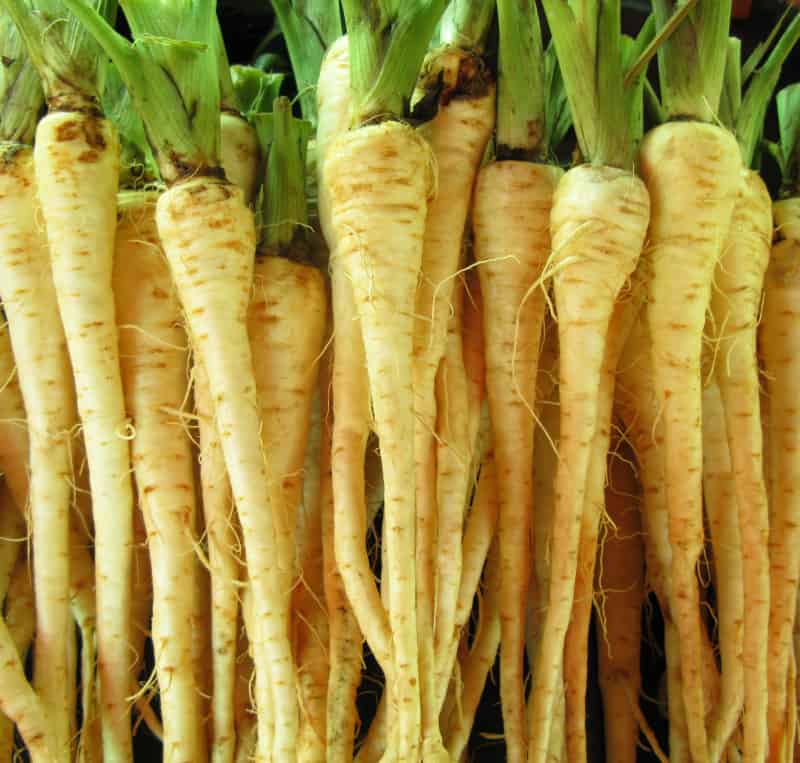Your pet rabbit’s diet is extremely important when it comes to maintaining optimal health. Rabbits have very sensitive digestive systems, so you may have wondered “can rabbits eat parsnips?. It is imperative that you feed them properly, and as a responsible pet owner you need to know exactly what your rabbit should eat and at what are the appropriate food ratios.
Parsnips often come up as a possible food choice for bunnies, and this may be because they look a lot like carrots and there is a general misconception that rabbits eat predominantly carrots. We can blame the movies for that one. In any case, here we will take a closer look at parsnips and whether or not they make the cut to be a part of your pet rabbit’s diet.
Can rabbits eat parsnips?
The simple answer is yes, bunnies can have parsnips. The real question really should be how much of this vegetable is you should be giving your rabbit. As you may already know a pet rabbit’s dietary needs are very specific. Any imbalance in their diet can lead to illness and gastric problems. So while a rabbit might be able to have a particular vegetable or fruit, the amount or portion size is extremely important. Every pet owner should be knowledgeable about exactly what their bunny should be eating. We will dividde a rabbit’s diet into four food groups.
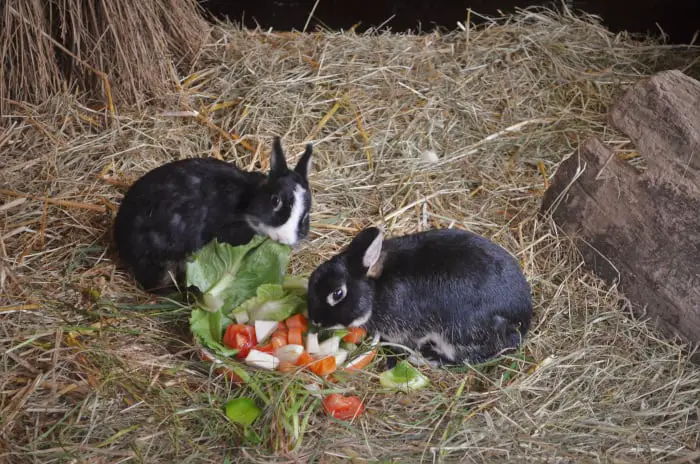
These are as follows:
- Grass/Hay – This makes up the majority of what your pet bunny consumes in a day. The experts recommend that your pet rabbit’s diet should consist of 80% of hay. This requirement should not be varied since this quantity of hay is essential for your rabbit’s proper digestion. Hay provides the majority of fiber that a rabbit needs in her diet.
- Vegetables – This good group provides your pet rabbit with minerals and vitamins. However, your rabbit does not need too much on a daily basis. Provide them to your rabbit in very small proportions. You should also vary the vegetables that you feed your rabbit, since each vegetable provides different nutrients to help keep your rabbit healthy.
- Fruits – These should be offered less than vegetables due to their sugar content. Even when choosing fruits, you should try to choose those that have lower sugar content. It is never a good idea for your rabbit to consume too many calories since this can lead to obesity. This can cause a range of health problems that most pet owners would rather avoid.
- Pellets – Not all pet owners opt to feed their rabbits pellets. Pellets are made predominantly made of hay and are infused with nutrients that your bunny needs. As mentioned before, pellets are optional. They are not necessary if your rabbit’s meals are covering all your pet rabbit’s dietary needs.
- So, as you know parsnips fall into the vegetable category. It is listed as one of the safe vegetables for rabbits. However a little goes a long way when it comes to your rabbit consuming vegetables on the whole.
What exactly are parsnips?
You may not have paid much attention to parsnips until you start considering it as a food option for your beloved bunny. Parsnips are root vegetables. They are cream in color and they become noticeably sweeter after the frosts of winter have passed in temperate countries. You could say they are “cousins” to parsley and carrots, since they all belong to the Apiaceae family of plants.
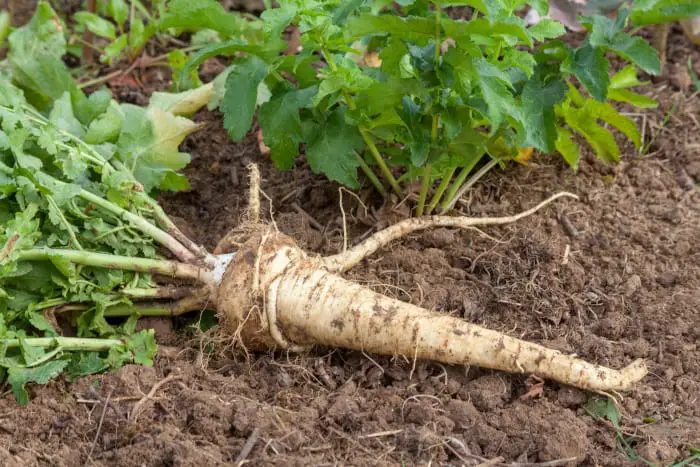
Are parsnips good for your pet rabbit?
We will go into the nutritional value of parsnips below. However, some of the benefits of parsnips need special mention.
- Diuretic properties – Parsnips are natural diuretics. Simply put your pet rabbit will urinate more. If your pet rabbit is experiencing kidney issues or urinary tract infections, parsnips can help.
- Low calories – Parsnips are low in calories. To give you an idea of how low, there are only 8 calories in one tablespoon of parsley. This is good news for your pet rabbit.
What is the nutritional value of parsnips?
As you may have guessed by now, parsnips are quite nutritious. Here is a list of the vitamins and minerals that can be found in parsnips and the health benefits that they offer.
- Water – A parsnip is made up mostly of water. You can say about 80%. So parsnips offer hydration to your pet rabbit.
- Carbohydrate – Parsnips have relatively high carbohydrate content. As such it is important to remember that you should not feed too much to your bunny.
- Dietary fiber – Bunnies need a healthy serving of fiber for their digestive systems to function properly. Fiber helps to prevent constipation. A rabbit that is not digesting its food properly is going to have to visit a veterinarian sooner or later.
- B Vitamins – Parsnips are rich in many of the B Vitamins. The B vitamins help your pet rabbit turn its food into energy. They impact wellness in general, promoting good health of the nervous system, brain, and heart. You can expect your rabbit to get the following B vitamins in a serving.
- Thiamine or B1
- Riboflavin or B2
- Niacin or B3
- Pantothenic acid or B4
- Vitamin B6
- Folate or B9
- Vitamin C – Parsnips are also a source of Vitamin C. However, they do not provide a large quantity of it. This is in fact good news for your rabbit. Since rabbits do not need vitamin C for good health. In fact, high quantities of Vitamin C may cause your bunny to suffer kidney damage.
- Vitamin E – This vitamin is essential for reproductive health in rabbits.
- Vitamin K – This vitamin ensures that your rabbit’s blood is healthy and able to clot properly.
- Parsnips are also rich in essential minerals. These are some of the minerals that you can expect your pet rabbit to get from parsnips.
- Zinc – Your bunny’s immune system will benefit from the zinc that is in parsnips.
- Potassium – This mineral is essential for your bunny’s proper growth. Potassium deficiency is baby rabbits could probably result in death.
- Manganese – According to studies, manganese is essential for proper bone development. 0.3 mg per day is enough to meet normal requirements
- Magnesium – This mineral is essential for good cardiovascular health. Additionally, a deficiency may cause convulsion and growth retardation in rabbits.
- Parsnips are also rich in antioxidants. Antioxidants are excellent for fighting cancers. They also have antifungal and anti-inflammatory properties. As you may already know rabbits are particularly susceptible to certain cancers. Parsnips can help in this fight.
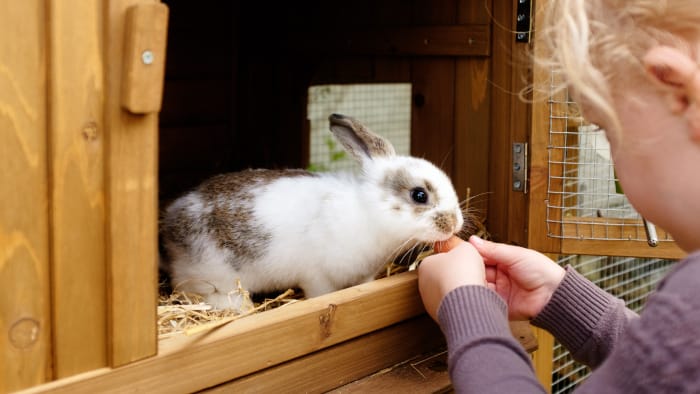
Can rabbits eat parsnip peelings?
Yes, you can feed your rabbit parsnip peelings. The peels are just as safe as the rest of the vegetable. However, the issue may be the consistency of the peelings. Bunnies have strong jaws and large teeth, it is more comfortable for them to eat something large like maybe a chunkier slice.
Can rabbits eat parsnip leaves?
This area is largely unexplored. Theoretically, it should be fine for your rabbit to eat parsnip tops. However, there may be a reason that you may not want to experiment. Apparently, parsnip leaves cause allergic skin reactions in humans. Since we are all mammals, there is the possibility that rabbits may be negatively affected as well. The point is would you want to take the chance? There are so many other green leafy safe choices that you can offer your pet rabbit instead.
How can I serve parsnips to my pet rabbit?
When you are offering parsnips, you should wash them thoroughly. Peel the vegetable and then cut into chunky slices. Offer your rabbit and see if he or she likes it. It should be stressed that you should never cook parsnips before feeding it to your rabbit. Vegetables should always be served raw and crunchy to your bunny. They may hurt themselves if they try to consume soft foods.
Some pet owners dip the parsnip slice in honey before giving it to their rabbit. The rabbit will certainly love it. However, this may not be a good habit to continue, since honey can cause tooth decay.
Also, it is important to note, that on the days that you feed your pet rabbit parsnips, you should not also feed them pellets. This is considered too many carbohydrates for one day.
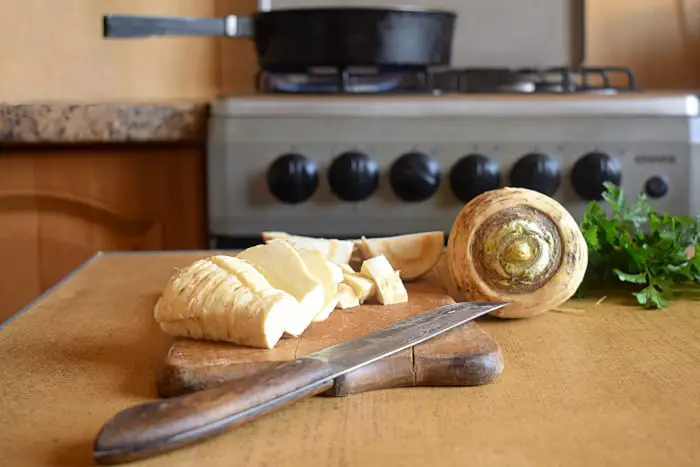
Do rabbits like parsnips?
Yes, your bunny will most likely love parsnips. This vegetable is high in carbohydrate content and sweet. Rabbits love sweets, even though excessive sweets are bad for your bunny. To be honest your rabbit may not always know what is good for him. Just like us, they gravitate to carbohydrates and sugary content. Bunnies also love the smell of parsnips. The vegetable has a rather pungent spicy smell that it gets from being a part of the parsley family.
As you can tell by now, your pet rabbit can have parsnips. However, moderation is the key. Parsnips do have health benefits and nutritional value. They can be a great addition to the variety of vegetables that you feed to your pet rabbit. They can be used interchangeably with celery, carrots, kale, celery, bell peppers, and cauliflower. This way your bunny is guaranteed a balanced diet with parsnips being apart of the package.

